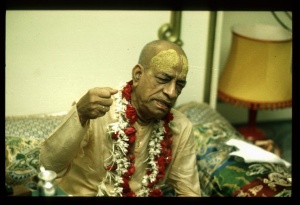CC Antya 4.191: Difference between revisions
m (1 revision(s)) |
No edit summary |
||
| Line 1: | Line 1: | ||
{{ | [[Category:Sri Caitanya-caritamrta - Antya-lila Chapter 04]] | ||
<div style="float:left">'''[[Sri Caitanya-caritamrta|Śrī Caitanya-caritāmṛta]] - [[CC Antya|Antya-līlā]] - [[CC Antya 4|Chapter 4: Sanātana Gosvāmī Visits the Lord at Jagannātha Purī]]'''</div> | |||
<div style="float:right">[[File:Go-previous.png|link=CC Antya 4.190|Antya-līlā 4.190]] '''[[CC Antya 4.190|Antya-līlā 4.190]] - [[CC Antya 4.192|Antya-līlā 4.192]]''' [[File:Go-next.png|link=CC Antya 4.192|Antya-līlā 4.192]]</div> | |||
{{CompareVersions|CC|Antya 4.191|CC 1975|CC 1996}} | |||
{{RandomImage}} | |||
==== TEXT 191 ==== | ==== TEXT 191 ==== | ||
<div | <div class="verse"> | ||
prabhu kahe,—“vaiṣṇava-deha ‘prākṛta’ kabhu naya | :prabhu kahe,—“vaiṣṇava-deha ‘prākṛta’ kabhu naya | ||
’aprākṛta’ deha bhaktera ‘cid-ānanda-maya’ | :’aprākṛta’ deha bhaktera ‘cid-ānanda-maya’ | ||
</div> | </div> | ||
| Line 12: | Line 16: | ||
==== SYNONYMS ==== | ==== SYNONYMS ==== | ||
<div | <div class="synonyms"> | ||
prabhu | ''prabhu kahe''—Śrī Caitanya Mahāprabhu said; ''vaiṣṇava deha''—the body of a Vaiṣṇava; ''prākṛta''—material; ''kabhu naya''—is never; ''aprākṛta''—transcendental; ''deha''—body; ''bhaktera''—of a devotee; ''cit-ānanda-maya''—full of transcendental bliss. | ||
</div> | </div> | ||
| Line 19: | Line 23: | ||
==== TRANSLATION ==== | ==== TRANSLATION ==== | ||
<div | <div class="translation"> | ||
Śrī Caitanya Mahāprabhu said, “The body of a devotee is never material. It is considered to be transcendental, full of spiritual bliss. | Śrī Caitanya Mahāprabhu said, “The body of a devotee is never material. It is considered to be transcendental, full of spiritual bliss. | ||
</div> | </div> | ||
| Line 26: | Line 30: | ||
==== PURPORT ==== | ==== PURPORT ==== | ||
<div | <div class="purport"> | ||
Śrī Caitanya Mahāprabhu is trying to convince Haridāsa Ṭhākura and Sanātana Gosvāmī that a devotee whose life is dedicated to the service of the Lord is never in the material conception. Because he always engages in the service of the Lord, his body is transcendental and full of spiritual bliss. One should never consider his body material, just as one should never consider the body of the Deity worshiped in the temple to be made of stone or wood. Factually, the Deity is directly the Supreme Personality of Godhead, without a doubt. The injunctions of the Padma Purāṇa therefore state, arcye viṣṇau śilā-dhīr guruṣu nara-matir vaiṣṇave jāti-buddhiḥ . . . yasya vā nārakī saḥ: “That person is a resident of hell who considers the Deity worshiped in the temple to be stone or wood, who considers the spiritual master an ordinary man, and who thinks that the body of a Vaiṣṇava fully dedicated to the service of the Lord belongs to the material modes of nature.” | Śrī Caitanya Mahāprabhu is trying to convince Haridāsa Ṭhākura and Sanātana Gosvāmī that a devotee whose life is dedicated to the service of the Lord is never in the material conception. Because he always engages in the service of the Lord, his body is transcendental and full of spiritual bliss. One should never consider his body material, just as one should never consider the body of the Deity worshiped in the temple to be made of stone or wood. Factually, the Deity is directly the Supreme Personality of Godhead, without a doubt. The injunctions of the ''Padma Purāṇa'' therefore state, ''arcye viṣṇau śilā-dhīr guruṣu nara-matir vaiṣṇave jāti-buddhiḥ . . . yasya vā nārakī saḥ'': “That person is a resident of hell who considers the Deity worshiped in the temple to be stone or wood, who considers the spiritual master an ordinary man, and who thinks that the body of a Vaiṣṇava fully dedicated to the service of the Lord belongs to the material modes of nature.” | ||
</div> | </div> | ||
__NOTOC__ | |||
<div style="float:right; clear:both;">[[File:Go-previous.png|link=CC Antya 4.190|Antya-līlā 4.190]] '''[[CC Antya 4.190|Antya-līlā 4.190]] - [[CC Antya 4.192|Antya-līlā 4.192]]''' [[File:Go-next.png|link=CC Antya 4.192|Antya-līlā 4.192]]</div> | |||
__NOTOC__ | |||
__NOEDITSECTION__ | |||
Revision as of 16:50, 27 September 2021

A.C. Bhaktivedanta Swami Prabhupada
TEXT 191
- prabhu kahe,—“vaiṣṇava-deha ‘prākṛta’ kabhu naya
- ’aprākṛta’ deha bhaktera ‘cid-ānanda-maya’
SYNONYMS
prabhu kahe—Śrī Caitanya Mahāprabhu said; vaiṣṇava deha—the body of a Vaiṣṇava; prākṛta—material; kabhu naya—is never; aprākṛta—transcendental; deha—body; bhaktera—of a devotee; cit-ānanda-maya—full of transcendental bliss.
TRANSLATION
Śrī Caitanya Mahāprabhu said, “The body of a devotee is never material. It is considered to be transcendental, full of spiritual bliss.
PURPORT
Śrī Caitanya Mahāprabhu is trying to convince Haridāsa Ṭhākura and Sanātana Gosvāmī that a devotee whose life is dedicated to the service of the Lord is never in the material conception. Because he always engages in the service of the Lord, his body is transcendental and full of spiritual bliss. One should never consider his body material, just as one should never consider the body of the Deity worshiped in the temple to be made of stone or wood. Factually, the Deity is directly the Supreme Personality of Godhead, without a doubt. The injunctions of the Padma Purāṇa therefore state, arcye viṣṇau śilā-dhīr guruṣu nara-matir vaiṣṇave jāti-buddhiḥ . . . yasya vā nārakī saḥ: “That person is a resident of hell who considers the Deity worshiped in the temple to be stone or wood, who considers the spiritual master an ordinary man, and who thinks that the body of a Vaiṣṇava fully dedicated to the service of the Lord belongs to the material modes of nature.”